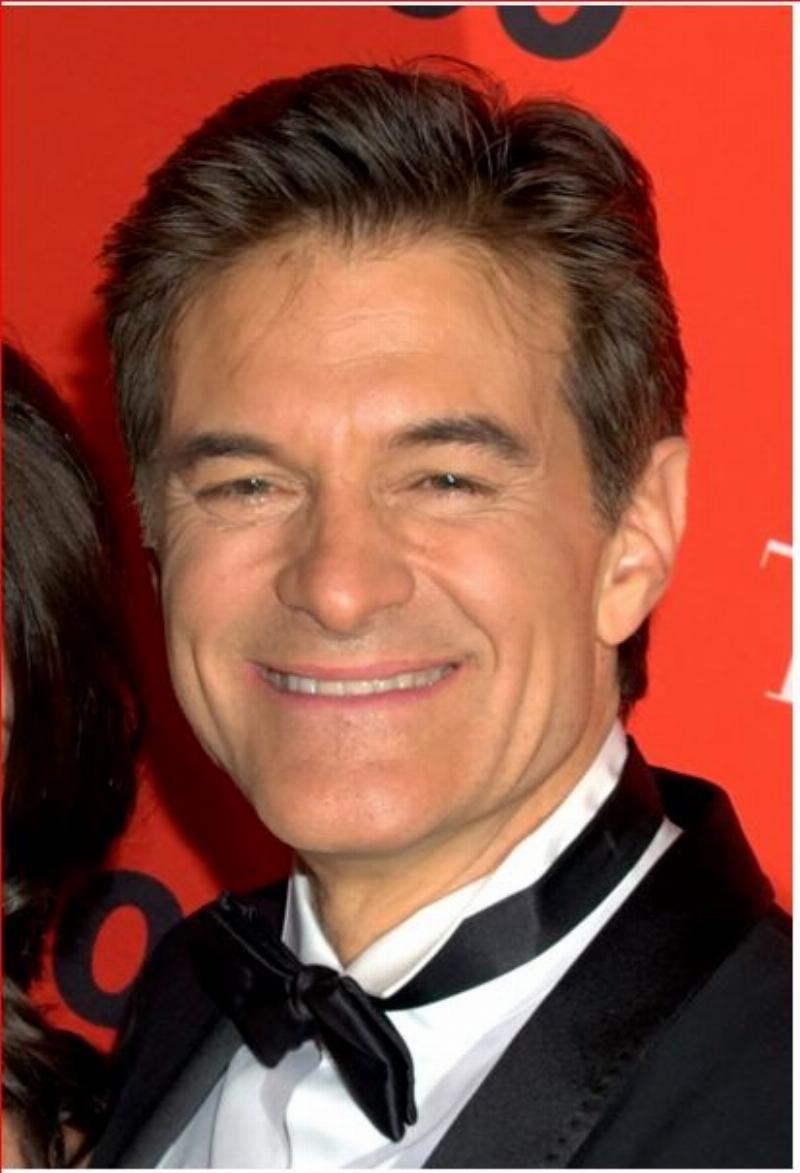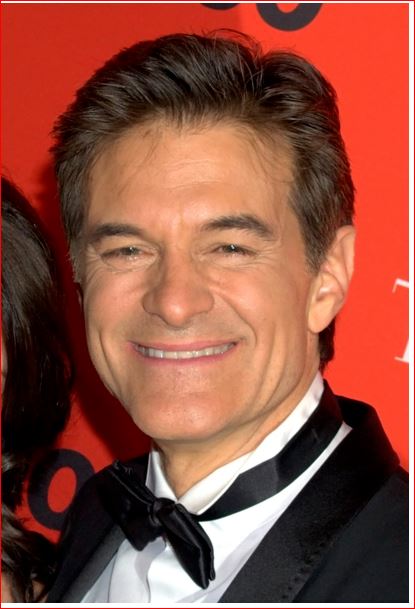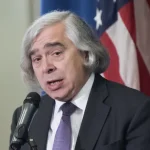

Photo Credit:Dr. Mehmet Oz
David Shankbone via wikim ccc2
Some skepticism about Dr. Oz's product endorsements, potential conflicts of interest, political pals, and shifting stances.
Mountebanks peddling miracle cures in the Old West would often pretend to be qualified doctors.
It is rare to come across mountebanks now, rarer still for qualified doctors to peddle miracle cures. But Dr. Mehmet Oz – a former cardiothoracic surgeon, famed purveyor of ‘medutainment’ on his T.V. show, and the man President-elect Donald Trump has nominated to administer Medicaid and Medicare – has been doing so unchecked.
On his show (that ran from 2009 to 2022) and on numerous other occasions, Dr. Oz has hyped dubious medical “miracles” and recommended cures that range from the anodyne, to the bizarre and dangerous.
Here’s a partial list: a bar of lavender soap in bed to relieve restless leg syndrome; green coffee bean extract and raspberry ketones for weight loss; red onions, endives, and sea bass to reduce the risk of ovarian cancer; a poop primer for self-assessing overall health; 200 orgasms annually to extend life expectancy by six years; selenium supplements to prevent cancer; colloidal silver for the common cold; and a supplement containing human chorionic gonadotropin (a placental hormone) for weight loss.
In fact, the AMA Journal of Ethics has called Dr. Oz “a dangerous rogue unfit for the office of America’s doctor,” earned by virtue of his show. In 2014, a Senate hearing on weight-loss scams chided him and told him to use his immense influence responsibly.
Yet, his dubious recommendations are not the only reason Dr. Oz is a questionable choice to head the Centers for Medicare and Medicaid Services (CMS), an agency that spends $2.6 trillion annually.
The following are of greater concern:
· Potential conflicts of interest will likely bias Dr. Oz’s decisions, for he has significant investments in healthcare and pharma companies, including the UnitedHealth Group, a critical CMS partner; in Amazon, which runs a Medicare-linked online pharmacy; and in Domino’s Pizzas, Pepsi, and U.S. Foods, makers of products linked to lifestyle diseases.
· Before he ran for Senate as a Republican candidate, Dr. Oz’s position on abortion, transgenderism, transitioning of children, and gun control were the opposite of what most Republicans and conservatives believe.
· Dr. Oz not only maintains Turkish citizenship – he voted in the 2018 Turkish elections, skipping a GOP primary in New Jersey – he is believed to be close to Recep Tayyip Erdogan, who has worked to destroy Kemalist secularism and restore fundamentalist Islam in Turkey since becoming president in 2014.
But before detailing these alarming facts, here is a brief account of Dr. Oz’s life, rise to celebrity, and entry into politics. He was born in Cleveland, Ohio, to Turkish-American Muslim parents. After an undergrad degree from Harvard, he earned an M.D. and and M.B.A. from the University of Pennsylvania. As a child, he spent time in Turkey; in his early twenties, he served for two months in the Turkish army, a requirement for maintaining dual citizenship.
He made his television debut in 2003 with a short-lived show his wife produced for the Discovery Channel. But fame arrived and grew from 2004 onwards, after appearances on the Oprah Winfrey Show as a medical expert, occasionally in his surgical scrubs. His own hugely popular show debuted in 2009. President-elect Trump appeared on the show in 2018.
In his first term, Trump had appointed Dr. Oz to the President’s Council on Sports, Fitness, and Nutrition. He was also the GOP’s candidate from Pennsylvania in the 2022 Senate election, but lost to John Fetterman. Unusual for a doctor, he had repeatedly mocked Fetterman’s health.
Last month, Trump chose Dr. Oz to oversee health insurance for 140 million Americans – seniors under Medicare, and low-income individuals under Medicaid. He will also be responsible for overhauling the Affordable Care Act (a.k.a., Obamacare). He is expected to work closely with Robert F. Kennedy, Jr., a Trump nominee who, if confirmed by the Senate, will lead the Department of Health and Human Services. The president-elect has asked them to reduce waste and fraud, and tackle “the illness industrial complex.”
But an umbilical cord seems to bind Dr. Oz to that complex. He reportedly has a stake in UnitedHealth worth as much as $600,000, according to NPR, a critical Centers for Medicare & Medicaid Services partner, and a smaller one in CVS Health, to which insurers Aetna (a subsidiary) and Cigna (a partner) are linked. UnitedHealth also faces a Justice Department investigation for overbilling the government and an antitrust case.
These companies are all major players in the Medicare Advantage market.
Dr. Oz also owns hospital stocks, and has $2.4 million stake in Amazon.
Trump wants Dr. Oz join hands with Kennedy, who is committed to fighting obesity and lifestyle diseases, which are clearly linked to junk food. The question is whether Dr. Oz’s investments in Pepsi and Domino’s will undermine that effort.
It is not clear if Dr. Oz will divest his holdings on becoming CMS chief or recuse himself every time a conflict of interest arises. His record with such matters does not raise hope. Public Citizen, a consumer watchdog group, has asked the Federal Trade Commission (FTC) to investigate him for violating promotional policies by not disclosing his connections to iHerb, a retailer of natural products, which he touts, to his five million followers on TikTok, X, and Instagram combined. He has a stake in iHerb, is the company’s global advisor, and gets paid to endorse their products.
Politically, Dr. Oz identified as a “conservative Republican” while running for the Senate in 2022, but this meant a dramatic shift from his previous positions. He supported abortion until a child is viable outside the womb (typically 24 weeks), but later said he was pro-life. In 2010, the Gay & Lesbian Alliance Against Defamation (GLADD) hailed him for his show supporting gender transitioning in children, but he later changed his views; in 2012, GLAAD and other LGBTQ groups condemned another show, in which he supported therapy to make gay people straight. He supported “red flag” laws for gun control, but later said he was a “proud gun owner” who does not believe “there should be any policy or law, state or federal, that prevents a law-abiding American from purchasing a gun….”
His Turkish connections run deep. He holds real estate in the country, including a building he leases for free to the Turkish education ministry, and has appeared in an ad for Turkey’s national airline. Perhaps his financial interests in Turkey prevent him from criticizing Erdogan, but he has in fact gone out of his way to cultivate the Turkish president. He met Erdogan in in 2014 and 2018, and honored the president at a dinner in New York. In 2019, he told a TV program that he had met with “our leader in Turkey” and asked how he could help represent Turkey.
Erdogan, a staunch Islamist and hater of Western civilization, supports Jihadists in Syria, aspires to reconquer the territories of the Ottoman empire, and believes that as the West “collapses with great clamor, our human-centered and divinely inspired civilization will rise again, stronger than ever.”
During Dr. Oz’s run for the Senate, former Secretary of State Mike Pompeo had called him a potential security threat over his ties to Turkey. “Maybe it’s all innocent, maybe it’s all straight up,” said Pompeo, “but we and the people of Pennsylvania and the Americans who he will be representing as one of 100 members of the U.S. Senate voting on important national security matters need to understand the scope and depth of his relationship with the Turkish government.”
With so many questions, Dr. Oz’s nomination to a critical federal agency needs serious rethinking. His suitability is as suspect as his recommendations: only 33% of them were scientifically supported, according to a study by University of Alberta Medical School scientists, published in the British Medical Journal. That, his chameleonic changes to safeguard his interests, and his artful charm – typical of mountebanks – make him problematic.
Image: David Shankbone, via Wikimedia Commons // CC BY 2.0 Deed





